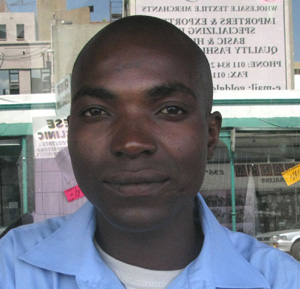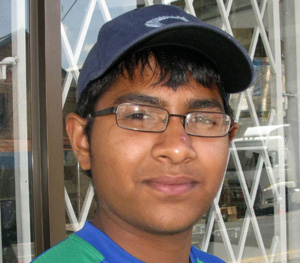On Friday, flocks around the world will be flagellating over the elaborate suicide of a deeply eccentric man. This is ironic considering the Christian faith has decreed that the taking of one’s life is a mortal sin.
I have spent most of my life studying eccentrics. I am not speaking here of the offbeat, but true eccentrics such as Helen Martins of Owl House fame. I cannot define eccentrics because their unpredictability makes them indefinable. There is, however, a discernable pattern in all their lives, which I discovered while researching the calling to become a traditional healer.
Like the shaman, eccentrics at some point experiences a devastating physical or psychological trauma, during which they have an epiphany. It’s so powerful they are convinced it is the word of God and if they do not act upon it they will die, making it their messianic purpose. Paradoxically, the scope of this is nearly always so broad that they set themselves up for failure, which leads to self-loathing and more often than not an excruciating suicide as chastisement; Martins cooked her insides with caustic soda.
Jesus came to me through my interactions with eccentric Nelspruit artist John Anthony Boerma, who at various times has taken on new personas. He has been Johnny Golightly, a recreation of Holly Golightly in Breakfast at Tiffany‘s, and more recently, Johnny Gochristly. Where Jesus came to take away the sins of the world, Johnny is here to take away societal parameters — the two things that would be absent in a perfect world.
With Boerma it was more difficult for me to pin down the exact trauma that made it all unfold the way it did, as it is with all psychological ones. But what became overwhelmingly apparent was that it was the weight of expectation of his upbringing. His mother, as a child, contracted diphtheria and in a hallucination was visited by the archangel Gabriel, who informed her that she would bear the next Messiah and Son of God. While Johnny was being delivered Gabriel again appeared to her in the form of her deceased Maltese poodle, Shatze.
“A son is being born to you and you are to name him John Anthony,” Gabriel instructed her. “You are to spend as much time with him to prepare him for his destiny. The Lord Most High is with you, and he has blessed you and set you apart from all other women.”
Is it coincidence that Johnny’s father’s hobby was carpentry? No matter. His mother raised him as Jesus and ever since Boerma has been challenging society’s boundaries — with as little success, mind you — as Christ during his lifetime. But it was through a growing desperation that finally set him to plotting.
What he came up with was a plan to take Nelspruit in a way similar to Jesus with Jerusalem, complete with the Last Supper. In this scheme I, unwittingly, was to be Judas — the confidant who supposedly betrays the Messiah for 30 pieces of silver. In the end, it didn’t work out that way; I refused to be used after working out what was going on in Boerma’s elaborate scheme, but that is another story told in my book Johnny Golightly Comes Home.
Through Johnny I can appreciate the personal mess that must have been Jesus after being raised with a messianic mission “in a country seething with frustration and discontent”. The problem was compounded by unfolding events. At first Jesus, like Boerma, was lionised, attracting a huge following with disciples who bowed and scraped before him. It’s what Andy Warhol would have called his 15 minutes of fame. Then it all began to ebb.
Historian Dr Michael Grant in his impeccable biography, Jesus, shows how through intense opposition from the establishment Jesus’s influence began to wane in Galilee, forcing him to abandon ministering in synagogues for preaching in open fields to dwindling devotees. He required a Big Event — one in which he knew the only outcome was death.
“What I now say to you; ponder my words,” Christ said to his disciples. “The Son of Man is to be given up into the power of men.”
But he was not to be given up, he provoked the powers-that-be to an extent he knew they would have no alternative other than to execute him. “Such a fatal denouement might still have been avoided if he had been prepared to change his course,” observed Grant. “But this he had no intention of doing.” So Jesus entered Jerusalem and Cleansed the Temple and “refused to give an unequivocal answer to inquiries whether he was the Messiah and Son of God”.
Not content with blasphemy, he added sedition when he implied he was King of the Jews to Pontius Pilate, which no Roman governor could ignore. Jesus was seeking the martyrdom so beloved by Palestinians as the glorious fate of prophets. Today this is called death by cop suicide, which involves provoking officialdom into using deadly force as a last resort.
So why has this grotesque suicide had an impact that would have even surprised Jesus? The answer is relatively simple. It has nothing to do with him and everything to do with organised religion.
We all have the capacity for spirituality, which leads us to ask compelling questions such as “who am I?” and “is this it?”. Throw in vivid imagination — think virgin births and multi-armed goddesses — with the propensity for some humans to want to control everyone and everything over every aspect of life. Then attach this to a compelling yarn and distort it however you wish to produce religion, which can then be paraded as truth to cage a public desperate for redemption from mortality through eternal life in the Kingdom of God.
It is these invisible prisons, the ones that Boerma has been sent to take away, that are imposed on us by organised religion and other organs of society as systems of control over our individual liberties. So let us build a church to Johnny Gochristly, who metaphorically died so we could be freed from this nonsense.
Pat Hopkins is the author of the recently released Johnny Golightly Comes Home, published by Penguin Books
Me and my god— Thembelihle Tshabalala

Haneefa Iqbal (50), Muslim I am Muslim so the basis of my religion is formed by reading the Namaaz and the Qu’ran. I pray, but not as often and I would like to. Prayer is a purified way of meditating — before you pray you should ensure that you have a cleansed body, mind, heart and soul.

Amelia Pienaar Sometimes I wonder why I am here. I wonder why my life is the way it is and then I pray. I am going through a divorce right now so I will start going to church regularly because I have nothing to lose. My children keep me spiritually grounded.

Ivin Moyo(27), Christian ZCC
I do things that will grant me blessings. I pray in the morning, when I am at work and at 12 midnight I wake up to pray no matter what the circumstances are. God is my life, he is everything to me and he brings me to light..

Dhiran Naran (17), Hindu
The thing that I like about my religion is that we pray in a different way. We pray near our box of goddesses and we use cotton wool and oil to light a lamp for the gods. We also light essence and pray with it. I am still trying to understand what it means to be Hindu, but so far I really like it.